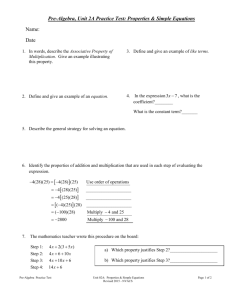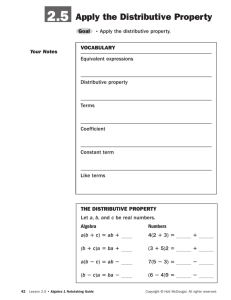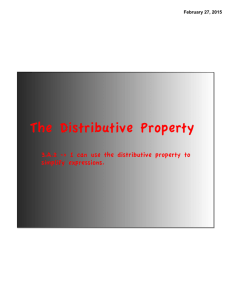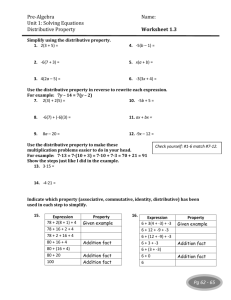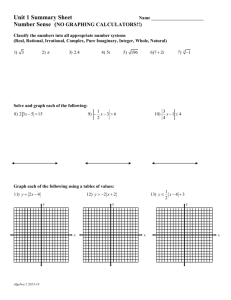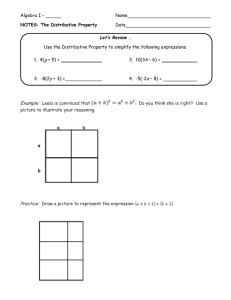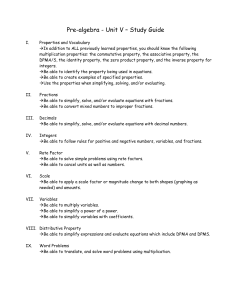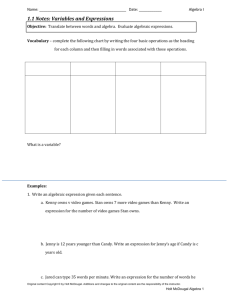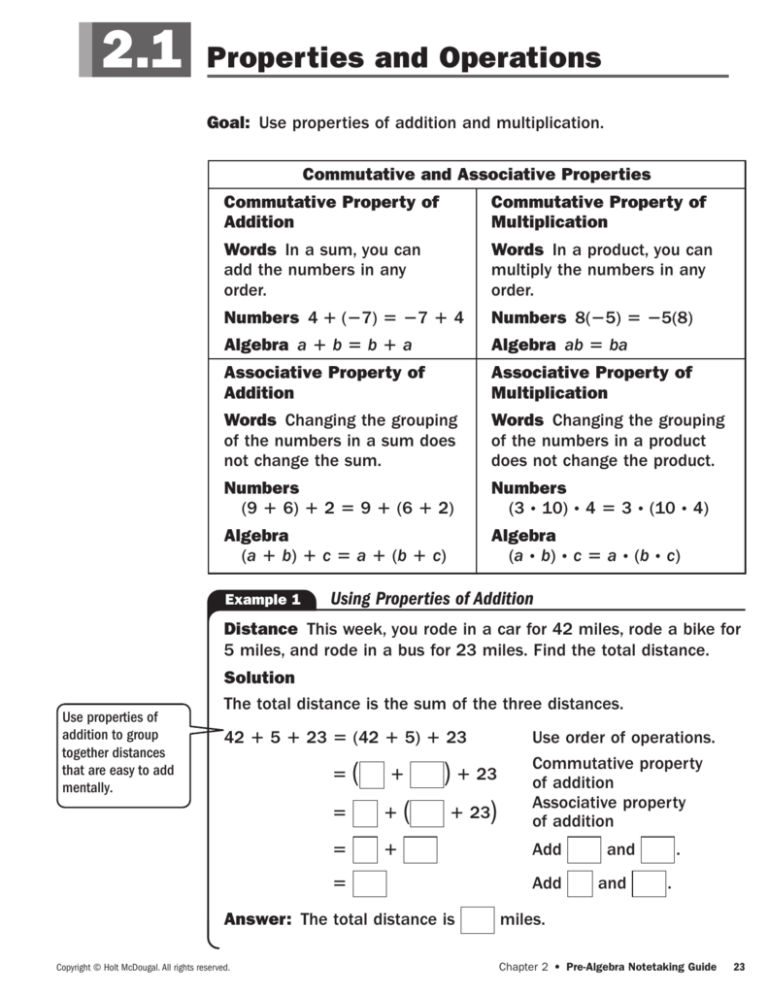
2.1
Properties and Operations
Goal: Use properties of addition and multiplication.
Commutative and Associative Properties
Commutative Property of
Addition
Commutative Property of
Multiplication
Words In a sum, you can
add the numbers in any
order.
Words In a product, you can
multiply the numbers in any
order.
Numbers 4 (7) 7 4
Numbers 8(5) 5(8)
Algebra a b b a
Algebra ab ba
Associative Property of
Addition
Associative Property of
Multiplication
Words Changing the grouping
of the numbers in a sum does
not change the sum.
Words Changing the grouping
of the numbers in a product
does not change the product.
Numbers
(9 6) 2 9 (6 2)
Numbers
(3 p 10) p 4 3 p (10 p 4)
Algebra
(a b) c a (b c)
Algebra
(a p b) p c a p (b p c)
Example 1
Using Properties of Addition
Distance This week, you rode in a car for 42 miles, rode a bike for
5 miles, and rode in a bus for 23 miles. Find the total distance.
Use properties of
addition to group
together distances
that are easy to add
mentally.
Solution
The total distance is the sum of the three distances.
42 5 23 (42 5) 23
(
(
) 23
23)
Answer: The total distance is
Copyright © Holt McDougal. All rights reserved.
Use order of operations.
Commutative property
of addition
Associative property
of addition
Add
Add
and
and
.
.
miles.
Chapter 2 • Pre-Algebra Notetaking Guide
23
2.1
Properties and Operations
Goal: Use properties of addition and multiplication.
Commutative and Associative Properties
Commutative Property of
Addition
Commutative Property of
Multiplication
Words In a sum, you can
add the numbers in any
order.
Words In a product, you can
multiply the numbers in any
order.
Numbers 4 (7) 7 4
Numbers 8(5) 5(8)
Algebra a b b a
Algebra ab ba
Associative Property of
Addition
Associative Property of
Multiplication
Words Changing the grouping
of the numbers in a sum does
not change the sum.
Words Changing the grouping
of the numbers in a product
does not change the product.
Numbers
(9 6) 2 9 (6 2)
Numbers
(3 p 10) p 4 3 p (10 p 4)
Algebra
(a b) c a (b c)
Algebra
(a p b) p c a p (b p c)
Example 1
Using Properties of Addition
Distance This week, you rode in a car for 42 miles, rode a bike for
5 miles, and rode in a bus for 23 miles. Find the total distance.
Use properties of
addition to group
together distances
that are easy to add
mentally.
Solution
The total distance is the sum of the three distances.
42 5 23 (42 5) 23
(5
5
) 23
( 42 23)
42
Use order of operations.
Commutative property
of addition
Associative property
of addition
5 65
Add 42 and 23 .
70
Add 5 and 65 .
Answer: The total distance is 70 miles.
Copyright © Holt McDougal. All rights reserved.
Chapter 2 • Pre-Algebra Notetaking Guide
23
Example 2
Using Properties of Multiplication
Evaluate 4xy when x 8 and y 15.
( )( )
[4(
)]( )
[
( )]( )
[( )( )]
( )
Substitute for x and for y.
Multiply
4xy 4
Use order of operations.
Commutative property of multiplication
Associative property of multiplication
Multiply
and
and
.
.
Checkpoint Evaluate the expression when x 7 and y 25.
1. (2x y) 46
Example 3
2. 4x 2y
Using Properties to Simplify Variable Expressions
Simplify the expression.
a. x 5 2 (x 5) 2 Use order of operations.
x (5 2)
x
property of addition
Add 5 and 2.
b. 3(9y) (3 p 9)y
property of multiplication
Multiply 3 and 9.
Checkpoint Simplify the expression.
3. n 6 7
24
Chapter 2 • Pre-Algebra Notetaking Guide
4. (4r)(3)
Copyright © Holt McDougal. All rights reserved.
Using Properties of Multiplication
Example 2
Evaluate 4xy when x 8 and y 15.
( )( 15 )
[4( 8 )]( 15 )
[ 8 ( 4 )]( 15 )
8 [( 4 )( 15 )]
8 ( 60 )
Substitute for x and for y.
480
Multiply 8 and 60 .
4xy 4 8
Use order of operations.
Commutative property of multiplication
Associative property of multiplication
Multiply 4 and 15 .
Checkpoint Evaluate the expression when x 7 and y 25.
1. (2x y) 46
2. 4x 2y
85
4900
Using Properties to Simplify Variable Expressions
Example 3
Simplify the expression.
a. x 5 2 (x 5) 2 Use order of operations.
x (5 2)
x 7
b. 3(9y) (3 p 9)y
27y
Associative property of addition
Add 5 and 2.
Associative property of multiplication
Multiply 3 and 9.
Checkpoint Simplify the expression.
3. n 6 7
n 13
24
Chapter 2 • Pre-Algebra Notetaking Guide
4. (4r)(3)
12r
Copyright © Holt McDougal. All rights reserved.
Identity Properties
Identity Property of
Addition
Identity Property of
Multiplication
Words The sum of a number
and the additive identity, 0,
is the number.
Words The product of a
number and the multiplicative
identity, 1, is the number.
Numbers 6 0 6
Numbers 4 p 1 4
Algebra a 0 a
Algebra a p 1 a
Example 4
Identifying Properties
Statement
Property Illustrated
a. (3 2) 4 3 (2 4)
b. 0 b b
c. 1(7) 7
d. cd dc
Checkpoint Identify the property that the statement illustrates.
5. (2 p 6) p 3 2 p (6 p 3)
Copyright © Holt McDougal. All rights reserved.
6. q (r) r q
Chapter 2 • Pre-Algebra Notetaking Guide
25
Identity Properties
Identity Property of
Addition
Identity Property of
Multiplication
Words The sum of a number
and the additive identity, 0,
is the number.
Words The product of a
number and the multiplicative
identity, 1, is the number.
Numbers 6 0 6
Numbers 4 p 1 4
Algebra a 0 a
Algebra a p 1 a
Example 4
Identifying Properties
Statement
Property Illustrated
a. (3 2) 4 3 (2 4)
Associative property of addition
b. 0 b b
Identity property of addition
c. 1(7) 7
Identity property of multiplication
d. cd dc
Commutative property of
multiplication
Checkpoint Identify the property that the statement illustrates.
5. (2 p 6) p 3 2 p (6 p 3)
Associative property
of multiplication
Copyright © Holt McDougal. All rights reserved.
6. q (r) r q
Commutative property
of addition
Chapter 2 • Pre-Algebra Notetaking Guide
25
Focus On
Measurement
Converting Between Systems of
Measurement
Use after Lesson 2.1
Goal: Convert between metric and U.S. customary units.
Quantity
Conversions
Example 1
Length
Capacity
Weight/Mass
1 in. 2.54 cm
1 fl oz ≈ 29.573 mL
1 oz ≈ 28.35 g
1 ft 0.3048 m
1 qt ≈ 0.946 L
1 lb ≈ 0.454 kg
1 mi ≈ 1.609 km
1 gal ≈ 3.785 L
1 t ≈ 907.2 kg
Converting Units of Measure
Copy and complete the statement. Round to the nearest whole
number.
?m
a. 24 ft ≈ Solution
? qt
b. 30 L ≈ 0.3048m ≈
a. 24 ft Answer: 24 ft ≈
b. 30 L ≈
Answer: 30 L ≈
m
m
1 qt
≈
qt
Checkpoint Copy and complete the statement. Round to the nearest
whole number.
? kg
1. 3 t ≈ 26
Chapter 2 • Pre-Algebra Notetaking Guide
? L
2. 41 qt ≈ Copyright © Holt McDougal. All rights reserved.
Focus On
Measurement
Converting Between Systems of
Measurement
Use after Lesson 2.1
Goal: Convert between metric and U.S. customary units.
Quantity
Conversions
Example 1
Length
Capacity
Weight/Mass
1 in. 2.54 cm
1 fl oz ≈ 29.573 mL
1 oz ≈ 28.35 g
1 ft 0.3048 m
1 qt ≈ 0.946 L
1 lb ≈ 0.454 kg
1 mi ≈ 1.609 km
1 gal ≈ 3.785 L
1 t ≈ 907.2 kg
Converting Units of Measure
Copy and complete the statement. Round to the nearest whole
number.
?m
a. 24 ft ≈ Solution
a. 24 ft 24 ft
? qt
b. 30 L ≈ 0.3048m ≈ 7 m
1 ft
Answer: 24 ft ≈ 7 m
1 qt
b. 30 L ≈ 30 L ≈ 32 qt
0.946 L
Answer: 30 L ≈ 32 qt
Checkpoint Copy and complete the statement. Round to the nearest
whole number.
? kg
1. 3 t ≈ 3 t ≈ 2722 kg
26
Chapter 2 • Pre-Algebra Notetaking Guide
? L
2. 41 qt ≈ 41 qt ≈ 39 L
Copyright © Holt McDougal. All rights reserved.
Comparing Units of Measure
Example 2
? 567 g using <, >, or .
Copy and complete the statement 25 oz ? 567 g
25 oz ?
25 oz ?
25 oz 25 oz
Answer:
20 oz
567 g
Checkpoint Copy and complete the statement using <, >, or .
? 9 kg
4. 15 lb ? 65 cm
3. 28 in. Using Multiple Conversion Factors
Example 3
? L. Round to the
Copy and complete the statement 180 fl oz ≈ nearest whole number.
Solution
1. Convert fluid ounces to
180 fl oz ≈
2. Convert
≈
to liters.
≈
Answer:
.
≈
180 fl oz ≈
Checkpoint Copy and complete the statement. Round to the
nearest whole number.
? cm
5. 5 ft ≈ Copyright © Holt McDougal. All rights reserved.
? m
6. 34 mi ≈ Chapter 2 • Pre-Algebra Notetaking Guide
27
Comparing Units of Measure
Example 2
? 567 g using <, >, or .
Copy and complete the statement 25 oz ? 567 g
25 oz Original statement
1 oz
? 567 g 25 oz Convert grams to ounces.
28.35 g
? 20 oz
25 oz Simplify.
25 oz >
Compare.
20 oz
20 oz > 567 g
Answer:
Checkpoint Copy and complete the statement using <, >, or .
? 9 kg
4. 15 lb ? 65 cm
3. 28 in. 28 in. > 65 cm
15 lb < 9 kg
Using Multiple Conversion Factors
Example 3
? L. Round to the
Copy and complete the statement 180 fl oz ≈ nearest whole number.
Solution
1. Convert fluid ounces to milliliters .
180 fl oz ≈ 180 fl oz 29.573 mL
≈ 5323.1 mL
1 fl oz
2. Convert 5323.1
milliliters to liters.
5323.1 mL ≈ 5323.1 mL 1L
≈ 5L
1000 mL
Answer:
180 fl oz ≈ 5 L
Checkpoint Copy and complete the statement. Round to the
nearest whole number.
? cm
5. 5 ft ≈ 5 ft ≈ 152 cm
Copyright © Holt McDougal. All rights reserved.
? m
6. 34 mi ≈ 34 mi ≈ 54,706 m
Chapter 2 • Pre-Algebra Notetaking Guide
27
2.2
The Distributive Property
Goal: Use the distributive property.
Vocabulary
Equivalent numerical
expressions:
Equivalent variable
expressions:
The Distributive Property
Algebra a(b c) ab ac
Numbers 4(6 3) (b c)a ba ca
(6 3)4 a(b c) ab ac
5(7 2) (b c)a ba ca
(7 2)5 Example 1
Using the Distributive Property
Crafts You are buying beads for a craft project. You need gold,
silver, and white beads. A bag of each type of bead costs $3.99.
Use the distributive property and mental math to find the total
cost of the beads.
Solution
Total cost 3(3.99)
Write expression for total cost.
( )
3(
) 3(
)
Rewrite 3.99 as
Multiply using mental math.
3
Chapter 2 • Pre-Algebra Notetaking Guide
.
Distributive property
Subtract using mental math.
Answer: The total cost of the beads is $
28
.
Copyright © Holt McDougal. All rights reserved.
2.2
The Distributive Property
Goal: Use the distributive property.
Vocabulary
Equivalent numerical Numerical expressions that have the
same value
expressions:
Equivalent variable Equivalent variable expressions have the
same value for all values of the variable(s).
expressions:
The Distributive Property
Algebra a(b c) ab ac
Numbers 4(6 3) 4(6) 4(3)
(b c)a ba ca
(6 3)4 6(4) 3(4)
a(b c) ab ac
5(7 2) 5(7) 5(2)
(b c)a ba ca
(7 2)5 7(5) 2(5)
Example 1
Using the Distributive Property
Crafts You are buying beads for a craft project. You need gold,
silver, and white beads. A bag of each type of bead costs $3.99.
Use the distributive property and mental math to find the total
cost of the beads.
Solution
Total cost 3(3.99)
Write expression for total cost.
(
)
3( 4 ) 3( 0.01 )
Rewrite 3.99 as 4 0.01 .
12 0.03
Multiply using mental math.
11.97
Subtract using mental math.
3 4 0.01
Distributive property
Answer: The total cost of the beads is $ 11.97 .
28
Chapter 2 • Pre-Algebra Notetaking Guide
Copyright © Holt McDougal. All rights reserved.
Checkpoint Use the distributive property to evaluate
the expression.
1. 2(9 4)
2. (12 3)3
3. (4 11)(4)
Evaluate the expression using the distributive property and
mental math.
4. 5(103)
Example 2
5. 4(3.8)
6. 3(6.03)
Writing Equivalent Variable Expressions
Use the distributive property to write an equivalent variable
expression.
a. 2(x 10) Distributive property
Multiply.
b. (m 3)(4) Multiply.
Definition of subtraction
c. 3(2y 6) Copyright © Holt McDougal. All rights reserved.
Distributive property
Distributive property
Multiply.
Definition of subtraction
Chapter 2 • Pre-Algebra Notetaking Guide
29
Checkpoint Use the distributive property to evaluate
the expression.
1. 2(9 4)
2. (12 3)3
26
3. (4 11)(4)
27
28
Evaluate the expression using the distributive property and
mental math.
4. 5(103)
5. 4(3.8)
515
Example 2
6. 3(6.03)
15.2
18.09
Writing Equivalent Variable Expressions
Use the distributive property to write an equivalent variable
expression.
a. 2(x 10) 2(x) 2(10)
Distributive property
2x 20
Multiply.
b. (m 3)(4) m(4) 3(4)
Distributive property
4m (12)
Multiply.
4m 12
Definition of subtraction
c. 3(2y 6) 3(2y) (3)(6)
Copyright © Holt McDougal. All rights reserved.
Distributive property
6y (18)
Multiply.
6y 18
Definition of subtraction
Chapter 2 • Pre-Algebra Notetaking Guide
29
Checkpoint Use the distributive property to write an equivalent
variable expression.
7. (x 7)4
8. 3(4m 7)
Finding Areas of Geometric Figures
Example 3
Find the area of the rectangle or triangle.
a.
b.
12 3y
5
3x 2
14
Solution
a. Use the formula for the
area of a rectangle.
1
2
(
)( )
( ) ( )
1
2
A bh A lw
b. Use the formula for the
area of a triangle.
(
(
(
)
)(
)
)
(
)
Answer: The area is
square units.
Answer: The area is
square units.
Checkpoint Find the area of the rectangle or triangle.
9.
10.
9 2y
7
5x 3
30
Chapter 2 • Pre-Algebra Notetaking Guide
10
Copyright © Holt McDougal. All rights reserved.
Checkpoint Use the distributive property to write an equivalent
variable expression.
7. (x 7)4
8. 3(4m 7)
4x 28
12m 21
Finding Areas of Geometric Figures
Example 3
Find the area of the rectangle or triangle.
a.
b.
12 3y
5
3x 2
14
Solution
a. Use the formula for the
area of a rectangle.
b. Use the formula for the
area of a triangle.
1
1
A bh 14
A lw
2
)( 12x 3y )
( 12 3y )
( 12 ) 7 ( 3y )
2
(
( 3x 2 )( 5 )
3x ( 5 ) 2 ( 5 )
7
15x 10
84 21y
Answer: The area is
(15x 10) square units.
7
Answer: The area is
(84 21y) square units.
Checkpoint Find the area of the rectangle or triangle.
9.
10.
9 2y
7
5x 3
35x 21
30
Chapter 2 • Pre-Algebra Notetaking Guide
10
45 10y
Copyright © Holt McDougal. All rights reserved.
2.3
Simplifying Variable Expressions
Goal: Simplify variable expressions.
Vocabulary
Terms of an
expression:
Coefficient of
a term:
Constant term:
Like terms:
Example 1
Identifying Parts of an Expression
Identify the terms, like terms, coefficients, and constant terms of
the expression 5 2x 3 x.
Solution
1. Write the expression as a sum:
.
2. Identify the parts of the expression. Note that because
x
x, the coefficient of x is
.
Terms:
Like terms:
Coefficients:
Constant terms:
Checkpoint Identify the terms, like terms, coefficients, and
constant terms of the expression.
1. 4y 6 3y
Copyright © Holt McDougal. All rights reserved.
2. 9 w 5 8w
Chapter 2 • Pre-Algebra Notetaking Guide
31
2.3
Simplifying Variable Expressions
Goal: Simplify variable expressions.
Vocabulary
Terms of an The parts of an expression that are added together
expression: are called terms.
Coefficient of The coefficient of a term with a variable is the
number part of the term.
a term:
Constant term: A constant term has a number but no variable.
Like terms:
Example 1
Like terms are terms that have identical variable
parts.
Identifying Parts of an Expression
Identify the terms, like terms, coefficients, and constant terms of
the expression 5 2x 3 x.
Solution
1. Write the expression as a sum: 5 (2x) (3) x .
2. Identify the parts of the expression. Note that because
x 1 x, the coefficient of x is 1 .
Terms: 5, 2x, 3, x
Like terms: 5 and 3; 2x and x
Coefficients: 2, 1
Constant terms: 5, 3
Checkpoint Identify the terms, like terms, coefficients, and
constant terms of the expression.
1. 4y 6 3y
Terms: 4y, 6, 3y
Terms: 9, w, 5, 8w
Like terms: 4y and 3y
Like terms: 9 and 5;
w and 8w
Coefficients: 4, 3
Constant term: 6
Copyright © Holt McDougal. All rights reserved.
2. 9 w 5 8w
Coefficients: 1, 8
Constant terms: 9, 5
Chapter 2 • Pre-Algebra Notetaking Guide
31
Example 2
Simplifying an Expression
5m 8 3m 7 5m 8 5m [
(
)(
(
)
(
)]m Write as a
sum.
)
(
)
(
Example 3
Commutative
property
)
Distributive
property
Simplify.
Simplifying Expressions with Parentheses
a. 3(x 2) x 9 x9
Distributive property
Group like terms.
Combine like terms.
b. 2k 5(k 4) 2k Distributive property
c. 5a (5a 7) 5a Combine like terms.
(5a 7)
Identity property
5a Distributive property
Combine like terms.
Simplify.
Checkpoint Simplify the expression.
32
3. 4y 6 3y
4. 9 w 5 8w
5. 4(x 1) 2 x 7
6. 6(k 3) 5k
Chapter 2 • Pre-Algebra Notetaking Guide
Copyright © Holt McDougal. All rights reserved.
Example 2
Simplifying an Expression
5m 8 3m 7 5m 8 5m [5
( 3m ) ( 7 )
( 3m ) 8 ( 3 )]m ( 7 )
8 Write as a
sum.
Commutative
property
( 7 )
2m 1
Example 3
Distributive
property
Simplify.
Simplifying Expressions with Parentheses
a. 3(x 2) x 9 3x 6 x 9
Distributive property
3x x 6 9
Group like terms.
2x 15
Combine like terms.
b. 2k 5(k 4) 2k 5k 20
3k 20
Distributive property
Combine like terms.
c. 5a (5a 7) 5a 1 (5a 7)
Identity property
5a 5a 7
Distributive property
07
Combine like terms.
7
Simplify.
Checkpoint Simplify the expression.
3. 4y 6 3y
7y 6
5. 4(x 1) 2 x 7
2x 11
32
Chapter 2 • Pre-Algebra Notetaking Guide
4. 9 w 5 8w
7w 4
6. 6(k 3) 5k
k 18
Copyright © Holt McDougal. All rights reserved.
2.4
Variables and Equations
Goal: Solve equations with variables.
Vocabulary
Equation:
Solution of an
equation:
Solving an
equation:
Example 1
Writing Verbal Sentences as Equations
Verbal Sentence
Equation
a. The sum of x and 4 is 8.
b. The difference of 7 and y is 13.
c. The product of 2 and p is 24.
d. The quotient of n and 3 is 5.
Example 2
Checking Possible Solutions
Tell whether 7 or 8 is a solution of x 3 5.
a. Substitute 7 for x.
b. Substitute 8 for x.
x35
x35
35
35
5
Answer: 7
solution.
Copyright © Holt McDougal. All rights reserved.
5
a
Answer: 8
solution.
a
Chapter 2 • Pre-Algebra Notetaking Guide
33
2.4
Variables and Equations
Goal: Solve equations with variables.
Vocabulary
Equation:
An equation is a mathematical sentence formed by
placing an equal sign, , between two expressions.
A solution of an equation with a variable is a
Solution of an number that produces a true statement when
equation:
it is substituted for the variable.
Solving an Finding all solutions of an equation is called solving
equation: the equation.
Example 1
Writing Verbal Sentences as Equations
Verbal Sentence
Equation
a. The sum of x and 4 is 8.
x48
b. The difference of 7 and y is 13.
7 y 13
c. The product of 2 and p is 24.
2p 24
d. The quotient of n and 3 is 5.
n
5
3
Example 2
Checking Possible Solutions
Tell whether 7 or 8 is a solution of x 3 5.
a. Substitute 7 for x.
b. Substitute 8 for x.
x35
x35
7 35
8 35
5
5
Answer: 7 is not a
solution.
Answer: 8
solution.
4
Copyright © Holt McDougal. All rights reserved.
5
is
a
Chapter 2 • Pre-Algebra Notetaking Guide
33
Checkpoint Write the verbal sentence as an equation.
1. The sum of x and 7 is 12.
2. The quotient of n and 4 is 16.
3. Tell whether 8 or 10 is a solution of x 4 6.
Example 3
Solving Equations Using Mental Math
Equation
Question
Solution
Check
a. x 4 7
47
b. 12 n 5
12 c. 18 3t
18 3
y
4
d. 5
5
( )
4
5
Checkpoint Solve the equation using mental math.
4. x 8 10
34
Chapter 2 • Pre-Algebra Notetaking Guide
5. 24 4m
c
3
6. 9
Copyright © Holt McDougal. All rights reserved.
Checkpoint Write the verbal sentence as an equation.
1. The sum of x and 7 is 12.
x 7 12
2. The quotient of n and 4 is 16.
n
16
4
3. Tell whether 8 or 10 is a solution of x 4 6.
8 is not a solution; 10 is a solution
Example 3
Solving Equations Using Mental Math
Equation
Question
Solution
a. x 4 7
What number plus 4
equals 7?
3
3 47
b. 12 n 5
12 minus what
number equals 5?
7
12 7 5
c. 18 3t
18 equals 3 times
what number?
6
18 3 6
y
4
d. 5
What number divided
by 4 equals 5?
Check
( )
20
4
5
20
Checkpoint Solve the equation using mental math.
4. x 8 10
18
34
Chapter 2 • Pre-Algebra Notetaking Guide
5. 24 4m
6
c
3
6. 9
27
Copyright © Holt McDougal. All rights reserved.
2.5
Solving Equations Using
Addition or Subtraction
Goal: Solve equations using addition or subtraction.
Vocabulary
Inverse operations:
Equivalent equations:
Subtraction Property of Equality
Words Subtracting the same number from each side of an
equation produces an equivalent equation.
Numbers If x 3 5, then x 3 Algebra If x a b, then x a x
5
b
, or x .
, or
.
Example 1
Solving an Equation Using Subtraction
Solve x 5 2.
Solution
When you solve an
equation, your goal is
to write an equivalent
equation that has
the variable by itself
on one side. This
process is called
solving for the
variable.
Use the subtraction property of equality to solve for x.
x 5 2
x5
Write original equation.
2 x
x 5 2
5 2
2
Copyright © Holt McDougal. All rights reserved.
from each side.
Simplify.
Answer: The solution is
Check:
Subtract
.
Write original equation.
Substitute for x.
.
Chapter 2 • Pre-Algebra Notetaking Guide
35
2.5
Solving Equations Using
Addition or Subtraction
Goal: Solve equations using addition or subtraction.
Vocabulary
Inverse operations:
Inverse operations are two operations
that undo each other, such as addition
and subtraction.
Equivalent equations:
Equivalent equations are equations that
have the same solution(s).
Subtraction Property of Equality
Words Subtracting the same number from each side of an
equation produces an equivalent equation.
Numbers If x 3 5, then x 3 3 5 3 , or x 2 .
Algebra If x a b, then x a a b a , or
x ba .
Example 1
Solving an Equation Using Subtraction
Solve x 5 2.
Solution
When you solve an
equation, your goal is
to write an equivalent
equation that has
the variable by itself
on one side. This
process is called
solving for the
variable.
Use the subtraction property of equality to solve for x.
x 5 2
x 5 5 2 5
x 7
Write original equation.
Subtract 5 from each side.
Simplify.
Answer: The solution is 7 .
Check:
x 5 2
7 5 2
2
Copyright © Holt McDougal. All rights reserved.
2
Write original equation.
Substitute for x.
Solution checks .
Chapter 2 • Pre-Algebra Notetaking Guide
35
Addition Property of Equality
Words Adding the same number to each side of an equation
produces an equivalent equation.
Numbers If x 3 5, then x 3 5
Algebra If x a b, then x a x
b
, or x .
, or
.
Solving an Equation Using Addition
Example 2
Solve 12 y 7.
Solution
Use the addition property of equality to solve for y.
12 y 7
12 Write original equation.
y7
Add
y
Simplify.
Answer: The solution is
to each side.
.
Checkpoint Solve the equation. Check your solution.
1. x 6 19
36
Chapter 2 • Pre-Algebra Notetaking Guide
2. 5 y 12
3. m 3 11
Copyright © Holt McDougal. All rights reserved.
Addition Property of Equality
Words Adding the same number to each side of an equation
produces an equivalent equation.
Numbers If x 3 5, then x 3 3 5 3 , or x 8 .
Algebra If x a b, then x a a b a , or
x ba .
Example 2
Solving an Equation Using Addition
Solve 12 y 7.
Solution
Use the addition property of equality to solve for y.
12 y 7
Write original equation.
12 7 y 7 7
19 y
Add 7 to each side.
Simplify.
Answer: The solution is 19 .
Checkpoint Solve the equation. Check your solution.
1. x 6 19
13
36
Chapter 2 • Pre-Algebra Notetaking Guide
2. 5 y 12
17
3. m 3 11
8
Copyright © Holt McDougal. All rights reserved.
2.6
Solving Equations Using
Multiplication or Division
Goal: Solve equations using multiplication or division.
Division Property of Equality
Words Dividing each side of an equation by the same nonzero
number produces an equivalent equation.
3x
12
Numbers If 3x 12, then , or x Remember that you
cannot divide a
number or an
expression by 0.
ax
.
b
Algebra If ax b and a 0, then , or x .
Solving an Equation Using Division
Example 1
Solve 7x 42.
Solution
7x 42
Write original equation.
7x
42
Divide each side by
x
Simplify.
Answer: The solution is
7x 42
Check:
7
.
(
) 42
42
.
Write original equation.
Substitute for x.
.
Checkpoint Solve the equation. Check your solution.
1. 5x 45
Copyright © Holt McDougal. All rights reserved.
2. 56 8y
Chapter 2 • Pre-Algebra Notetaking Guide
37
2.6
Solving Equations Using
Multiplication or Division
Goal: Solve equations using multiplication or division.
Division Property of Equality
Words Dividing each side of an equation by the same nonzero
number produces an equivalent equation.
3x
12
3
3
Numbers If 3x 12, then , or x 4 .
Remember that you
cannot divide a
number or an
expression by 0.
ax
b
b
Algebra If ax b and a 0, then , or x a .
a
a
Solving an Equation Using Division
Example 1
Solve 7x 42.
Solution
7x 42
Write original equation.
7x
42
7
7
Divide each side by 7 .
x 6
Simplify.
Answer: The solution is 6 .
7x 42
Check:
(
7 6
42
) 42
42
Write original equation.
Substitute for x.
Solution checks .
Checkpoint Solve the equation. Check your solution.
1. 5x 45
2. 56 8y
9
Copyright © Holt McDougal. All rights reserved.
7
Chapter 2 • Pre-Algebra Notetaking Guide
37
Multiplication Property of Equality
Words Multiplying each side of an equation by the same nonzero
number produces an equivalent equation.
x
3
x
3
Numbers If 12, then
p x
a
Algebra If b and a 0, then
p 12, or x x
a
p .
p b, or x .
Solving an Equation Using Multiplication
Example 2
w
11
Solve 5 .
Solution
w
11
5 p5
Write original equation.
w
11
p w
Answer: The solution is
Multiply each side by
.
Simplify.
.
Checkpoint Solve the equation. Check your solution.
m
4
3. 11
38
Chapter 2 • Pre-Algebra Notetaking Guide
c
6
4. 9 Copyright © Holt McDougal. All rights reserved.
Multiplication Property of Equality
Words Multiplying each side of an equation by the same nonzero
number produces an equivalent equation.
x
3
x
3
Numbers If 12, then 3 p 3 p 12, or x 36 .
x
a
x
a
Algebra If b and a 0, then a p a p b, or x ab .
Solving an Equation Using Multiplication
Example 2
w
11
Solve 5 .
Solution
w
11
5 w
11 p 5 11 p 11
55 w
Write original equation.
Multiply each side by 11 .
Simplify.
Answer: The solution is 55 .
Checkpoint Solve the equation. Check your solution.
c
6
m
4
3. 11
4. 9 44
38
Chapter 2 • Pre-Algebra Notetaking Guide
54
Copyright © Holt McDougal. All rights reserved.
2.7
Decimal Operations and
Equations with Decimals
Goal: Solve equations involving decimals.
Example 1
Adding and Subtracting Decimals
a. Find the sum 1.7 (3.4).
Use the rule for adding numbers with the same sign. Add
and
. Both decimals are
, so the
sum is
.
1.7 (3.4) b. Find the difference 21.29 (34.62).
First rewrite the difference as a sum: 21.29 34.62. Then
use the rule for adding numbers with different signs. Subtract
from
.
>
, so the sum
has the same sign as
.
21.29 (34.62) Checkpoint Find the sum or difference.
1. 2.8 (5.9)
Copyright © Holt McDougal. All rights reserved.
2. 7.12 (3.46)
Chapter 2 • Pre-Algebra Notetaking Guide
39
2.7
Decimal Operations and
Equations with Decimals
Goal: Solve equations involving decimals.
Example 1
Adding and Subtracting Decimals
a. Find the sum 1.7 (3.4).
Use the rule for adding numbers with the same sign. Add
1.7 and 3.4 . Both decimals are negative , so the
sum is negative .
1.7 (3.4) 5.1
b. Find the difference 21.29 (34.62).
First rewrite the difference as a sum: 21.29 34.62. Then
use the rule for adding numbers with different signs. Subtract
21.29 from 34.62 . 34.62 > 21.29 , so the sum
has the same sign as 34.62 .
21.29 (34.62) 13.33
Checkpoint Find the sum or difference.
1. 2.8 (5.9)
2. 7.12 (3.46)
8.7
10.58
Copyright © Holt McDougal. All rights reserved.
Chapter 2 • Pre-Algebra Notetaking Guide
39
You can use
estimation to check
the results of
operations with
decimals. For
instance, notice that
29.07 (1.9)
15.3 is about
30 (2), or 15.
So, an answer of
15.3 is reasonable.
Multiplying and Dividing Decimals
Example 2
a. 0.4(13.7) Different signs: Product is
.
b. 2.5(6.75) Same signs: Product is
.
c. 23.49 (2.9) Same signs: Quotient is
.
d. 18.05 (1.9) Different signs: Quotient is
.
Checkpoint Find the product or quotient.
3. 2.8(5.9)
4. 7.093 (3.46)
Solving Addition and Subtraction Equations
Example 3
Solve the equation.
a. x 6.3 4.8
b. y 5.74 3.51
Solution
x 6.3 4.8
a.
x 6.3 4.8 x
y 5.74 3.51 y
40
Chapter 2 • Pre-Algebra Notetaking Guide
Subtract
from each side.
Simplify.
y 5.74 3.51
b.
Write original equation.
Write original equation.
Add
to each side.
Simplify.
Copyright © Holt McDougal. All rights reserved.
You can use
estimation to check
the results of
operations with
decimals. For
instance, notice that
29.07 (1.9)
15.3 is about
30 (2), or 15.
So, an answer of
15.3 is reasonable.
Example 2
Multiplying and Dividing Decimals
a. 0.4(13.7) 5.48
Different signs: Product is
negative .
b. 2.5(6.75) 16.875
Same signs: Product is
positive .
c. 23.49 (2.9) 8.1
Same signs: Quotient is
positive .
d. 18.05 (1.9) 9.5
Different signs: Quotient is
negative .
Checkpoint Find the product or quotient.
3. 2.8(5.9)
4. 7.093 (3.46)
2.05
16.52
Example 3
Solving Addition and Subtraction Equations
Solve the equation.
a. x 6.3 4.8
b. y 5.74 3.51
Solution
x 6.3 4.8
a.
x 6.3 6.3 4.8 6.3
x 1.5
Subtract 6.3 from each side.
Simplify.
y 5.74 3.51
Write original equation.
y 5.74 5.74 3.51 5.74
Add 5.74 to each side.
b.
y 2.23
40
Write original equation.
Chapter 2 • Pre-Algebra Notetaking Guide
Simplify.
Copyright © Holt McDougal. All rights reserved.
Checkpoint Solve the equation. Check your solution.
5. x 5.6 9.4
Example 4
6. 3.5 y 1.2
7. m 5.3 7.2
Solving Multiplication and Division Equations
Solve the equation.
a. 0.8m 4.8
n
5
b. 2.15
Solution
a. 0.8m 4.8
0.8m
4.8
m
b.
n
2.15
5
n
(2.15)
5
n
Write original equation.
Divide each side by
.
Simplify.
Write original equation.
Multiply each side by
.
Simplify.
Checkpoint Solve the equation. Check your solution.
8. 6x 43.2
Copyright © Holt McDougal. All rights reserved.
y
3.1
9. 8.4
Chapter 2 • Pre-Algebra Notetaking Guide
41
Checkpoint Solve the equation. Check your solution.
5. x 5.6 9.4
6. 3.5 y 1.2
4.7
3.8
Example 4
7. m 5.3 7.2
1.9
Solving Multiplication and Division Equations
Solve the equation.
a. 0.8m 4.8
n
5
b. 2.15
Solution
a. 0.8m 4.8
0.8m
4.8
0.8
0.8
m 6
b.
5
n
2.15
5
n
5 (2.15)
5
n 10.75
Write original equation.
Divide each side by 0.8 .
Simplify.
Write original equation.
Multiply each side by 5 .
Simplify.
Checkpoint Solve the equation. Check your solution.
8. 6x 43.2
7.2
Copyright © Holt McDougal. All rights reserved.
y
3.1
9. 8.4
26.04
Chapter 2 • Pre-Algebra Notetaking Guide
41
2
Words to Review
Give an example of the vocabulary word.
Additive identity
Multiplicative identity
Equivalent numerical expressions
Equivalent variable expressions
Term, coefficient,
constant term, like terms
Equation
Solution of an equation
Solving an equation
Inverse operations
Equivalent equations
Review your notes and Chapter 2 by using the Chapter Review on
pages 108–111 of your textbook.
42
Chapter 2 • Pre-Algebra Notetaking Guide
Copyright © Holt McDougal. All rights reserved.
2
Words to Review
Give an example of the vocabulary word.
Additive identity
0
Equivalent numerical expressions
3(3.99) 3(4 0.01)
Term, coefficient,
constant term, like terms
5 2x 3 x
Terms: 5, 2x, 3, x
Like terms: 5 and 3;
2x and x
Coefficients: 2, 1
Constant terms: 5, 3
Solution of an equation
5 is a solution of 2x 10.
Inverse operations
Addition and subtraction;
Multiplication and division
Multiplicative identity
1
Equivalent variable expressions
2(x 10) 2x 20
Equation
2x 10
Solving an equation
x 5 2
x 5 5 2 5
x 7
Equivalent equations
2x 10 and x 5
Review your notes and Chapter 2 by using the Chapter Review on
pages 108–111 of your textbook.
42
Chapter 2 • Pre-Algebra Notetaking Guide
Copyright © Holt McDougal. All rights reserved.

